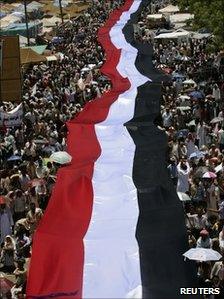Yemen unrest: Largest pro-Saleh rally held in Sanaa
- Published
President Saleh's supporters waved flags and cheered
Yemen's president has welcomed the Gulf Arab plan for a transition of power, in a speech to the largest demonstration by his supporters so far.
But Ali Abdullah Saleh made no commitment to accept the plan.
Hundreds of thousands rallied in his support in the capital, Sanaa, while similar numbers of opponents met nearby and in the southern city of Taiz.
At least 120 people have died in two months of protests demanding the end of Mr Saleh's 32-year rule.
Rival rallies
Huge crowds gathered near the main mosque in the capital Sanaa, calling on President Saleh to retain power until his term ends in 2013.
In a very short speech, the 69-year-old leader said he welcomed the initiative of the Gulf Co-operation Council (GCC) that proposes a transfer of power to the vice-president.
But he said any arrangements had to be "within the framework of the Yemen constitution" - language which could mask objections to the plan.
Some of the president's allies suggest that he is open to leaving office, but many in the crowd fear that instability would follow his departure, says the BBC's Lina Sinjab in Sanaa.
On the other side of capital, his opponents gathered in an area they now call Change Square.
Chanting "Go, go", they demanded that Mr Saleh leave immediately. Most are sceptical of any initiative that would allow him to remain in office, even if power were transferred to his deputy.
In Yemen's third largest city, Taiz, riot police fired in the air to keep vast crowds of pro- and anti-Saleh demonstrators apart, witnesses said. No casualties were reported.

There are weekly protests against Mr Saleh in Taiz
Exit plan
The GCC proposal would see Mr Saleh quit within a month of signing the agreement and hand over to his vice-president.
It suggests that Mr Saleh appoint an opposition leader to run a new cabinet that would prepare for presidential elections two months later.
It also offers immunity from prosecution to Mr Saleh, his family and aides - something the opposition has roundly rejected.
Over the past two months, Mr Saleh has used violence to try to quell the unrest. He has also offered concessions, including a pledge not to run again for president or allow his son to succeed him, but to no avail.
Mr Saleh's weak central government already has little control beyond the capital. In recent years, it has struggled to confront an armed rebellion in the north and a secessionist movement in the south.
Elsewhere in the country, at least 10 soldiers were killed in three attacks by tribesmen and al-Qaeda militants, officials said.
- Published20 April 2011
- Published18 April 2011
- Published17 April 2011
- Published21 March 2011
- Published6 April 2011
- Published28 March 2011